International Domestic Workers Day, 16 June 2021
Date of Publication: 16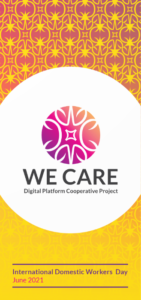 June 2021
June 2021
This is a brief pamphlet to celebrate International Domestic Workers Day. [View resource]
International Domestic Workers Day, 16 June 2021 Read More »
Date of Publication: 16 June 2021
June 2021
This is a brief pamphlet to celebrate International Domestic Workers Day. [View resource]
International Domestic Workers Day, 16 June 2021 Read More »
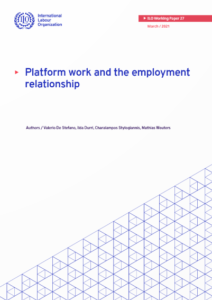 Authors: Valerio De Stefano, Ilda Durri, Charalampos Stylogiannis and Mathias Wouters.
Authors: Valerio De Stefano, Ilda Durri, Charalampos Stylogiannis and Mathias Wouters.
Date of Publication: 2021
This working paper analyses national and supranational case law and legislation about the
employment status of platform workers. It does so by referring to the ILO Employment Relationship
Recommendation, 2006 (No. 198). It finds that this Recommendation provides for a valuable
compass to navigate the issues that emerge from the analysis of the existing case law and legislation
about platform work. [View resource]
ILO – Platform work and the employment relationship Read More »
2021 – Journal Articles and Book Chapters Read More »
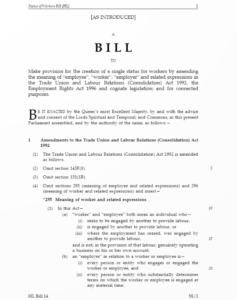 Author: Institute of Employment Rights
Author: Institute of Employment Rights
Date of Publication: 2021
Lord Hendy QC, who introduced the Bill, described its purpose as follows: “The bill is intended to deal with the problem posed by the current state of labour law which permits employers to classify workers into legal categories, many of which do not have the statutory employment rights which Parliament has stipulated employees should have. There are five such legal categories: ‘employees’ with full rights; ‘limb (b) workers’ with limited rights; ‘bogus self-employed workers’ with no rights; workers with ‘personal service companies’ with full rights but enforceable only against themselves; and, finally, the genuinely ‘self-employed’ in business on [their] own account with [their] own clients. The bill resolves this complex picture by designating all the first four categories as ‘workers’ with all statutory employment rights (subject to length of service qualifications). Only the fifth category will be unaffected. [View Resource]
UK – Status of Workers Bill Read More »
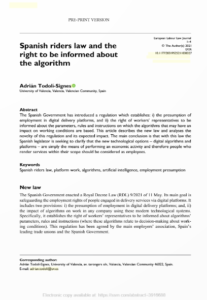 Author: Adrian Todoli-Signes
Author: Adrian Todoli-Signes
Date of Publication: 2021
The Spanish Government has introduced a regulation which establishes: i) the presumption of employment in digital delivery platforms, and ii) the right of workers’ representatives to be informed about the parameters, rules and instructions on which the algorithms that may have an impact on working conditions are based. This article describes the new law and analyses the novelty of this regulation and its expected impact. [View Resource]
Spanish riders law and the right to be informed about the algorithm Read More »
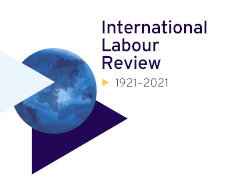 Guest Editor: Ravi Kanbur
Guest Editor: Ravi Kanbur
A Centenary Issue on Informality to mark the 100th anniversary of the International Labour Review
(ILR). The issue comprises ten articles published in the ILR between 1975 and 2016 that are devoted
exclusively to the analysis of informality. [View Resource]
International Labour Review: Centenary Issue No. 1: Informality Read More »
Ratula Beukman
Are we ready for platform co-ops in South Africa?
In many parts of the world, cooperatives are harnessing the “platform economy” for the benefit of
communities, and this movement is growing in strength. Could worker-owned co-ops in South Africa
get a grip on the digital economy and, in doing so, contribute to help our communities stand
together to beat their socio-economic struggles. What does it take for a worker-owned co-op to
survive the pressures of the economy? Is it a quantum leap for a co-op to use open source software
and transform itself into a platform co-op taking account of the socio-economic context of South
Africa? Is there any support for platform co-ops in South Africa? There are many questions and not
yet many answers around platform co-ops in South Africa.
South Africa is a beautiful country and rich in mineral resources. It is also a country of shocking
contrasts where millions battle the daily challenges of growing inequality and poverty. The official
unemployment rate stands at a mind-blowing 32.5% (7.2 million people) in the fourth quarter of
2020, representing the highest rate since the global economic crisis of 2008, while South Africa
remains one of the world’s most unequal societies with a Gini coefficient or wealth distribution
index of 0.625.
The COVID-19 pandemic has intensified these problems. According to a recent National Income
Dynamics Study (NIDS), 42% of adults in grant-receiving households lost their primary source of
household income, while 54% of families are not receiving state support and are living on the brink
of existence. A recent report by the International Labour Organisation, identified job losses as the
biggest challenge, which became much worse during the COVID-19 lockdown period. Ordinary
citizens, experts in labour law and other disciplines, and an array of civil society organisations, as
well as government, are looking for ways to navigate the deep-rooted social and economic
challenges exacerbated by the COVID-19 pandemic.
At this point there are few indications of what is to be done fundamentally and structurally. A
necessary intervention to assist in the immediate period is the rollout of an Unemployment
Insurance Fund Coronavirus Covid-19 Relief Benefit to enable employers to pay workers during
lockdown. Only specific industry sectors and workers were considered essential by disaster
regulations. Besides delivering much-needed health services to the poor, priority rollout of
the COVID-19 vaccine to the most vulnerable is beginning to happen. A further intervention, to
alleviate the dire economic situation on the broader population, focuses on expanding the social
assistance programme for unemployed people to receive an unconditional monthly grant of R350 (or
USD24) to improve food security. At present, this income support is only available until the end of
April 2021.
Creative and long-standing interventions are needed to deal with the structural challenges faced in
South Africa. In particular, there is urgency to reimagine employment. Commercial platforms are
fundamentally shifting how work is organised for workers who participate in the platform economy.
But, according to the latest report of the Fairwork Project, commercial platform workers “face unfair
work conditions, and lack the benefits and protections afforded to employees” like the right to fair
pay, fair conditions, fair contracts, fair management, and fair representation. It so no wonder that
for some time now, worldwide, platform workers themselves, trade unions and legal writers are
shining a spotlight on the employment protection of precarious and low paid platform workers. In
South Africa, platform workers are still considered “independent contractors” and not
“employees” and are not regulated by employment and labour laws. In a recent ruling the UK
Supreme Court deem Uber drivers as workers and not independent contractors. This means that
they are afforded some rights and protections under the labour and employment laws, including
holiday pay, rest breaks, the national minimum wage and protection against unlawful discrimination.
What will a business look like if the platform workers seen everywhere delivering goods and food,
operating taxis and delivering domestic services via a digital commercial “platforms” own the
platform itself?
This question is being addressed by the newly established Centre for the Transformative Regulation
of Work (CENTROW) at the University of the Western Cape. The Centre’s Domestic worker Co-
operative Platform Project (DPCP) aims to build a model for decent work in the platform
economy for domestic workers. An international precedent is provided by the domestic worker co-
ops, Up and Go and Brightly, in New York, where domestic workers own the platform collectively
and determine their decent working conditions in contrast to commercial companies owning
platforms like Uber, SweepSouth, and OrderIn.
Worker co-ops have been seen as an economic alternative that is workable, resilient and exciting,
and, on the other hand a complex, specialised form of enterprise, and requiring high levels of
internal skill or external technical support to succeed. Worker co-ops are where humanity is placed
at the centre of a viable business. It is believed that cooperatives could achieve more to advantage
poor and vulnerable communities to meet their needs rather than individuals working by
themselves. The International Cooperative Alliance (ICA) defines a cooperative as “people-centred
enterprises owned, controlled and run by and for their members to realise their common economic,
social, and cultural needs and aspirations.” This type of business entity in principle would forge links
with similar cooperatives and has the ability to increase its bargaining power when dealing with
other competitive organisations.
In 1969, the South African liberation movement decided that, after democracy is achieved, the
economy will be a three-way system, propelled by a combination of enterprises owned by the state,
private individuals and cooperatives “as a tool for facilitating the establishment of community-
owned enterprises and worker-owned enterprises”. At the time, the reality was very different. The
economy was dominated by corporate conglomerates. Registered South African co-operatives were
operating along racially divided lines, with state support aligned to the primary strong white
agricultural cooperatives. In contrast, ‘stokvels’ were an age-old ‘informal’ financial co-operative
consisting mainly of women who save monies together to pay for family events like funerals,
weddings, and other costly celebrations. This co-operative was and is based on open and voluntary
membership, where the contributors to the ‘stokvel’ control how economic participation and
distribution occur.
Since 2004, the Department of Small Business Development has been obliged to promote and
develop co-operatives. It introduced a Cooperatives Act in 2005 (amended in 2013), alongside
support devoted to ’emerging’ co-operatives. With the policy and legislation in place, it is estimated
that South Africa has over 48 000 registered co-operatives in 2016 compared to about 4 000 in 2005.
However, the explosion of co-operatives in South Africa has seen a failure rate of about 88 per cent
and “does not represent a vibrant or coherent co-operative movement”. The Minister for Small
Business Development’s 2021/22 Annual Performance Plan promises to finalise and implement a
SMMEs and Co-operatives Funding Policy to “improve access to finance and coordinate financial
investment of both public and private sector”. But, even if financial support for co-operatives is well
thought through, it does not mean that co-ops using platforms will have a chance against
transnational platforms like Facebook or Google.
Therefore, apart from considerations about what type of worker-owned entity is most appropriate,
there are further important considerations in harnessing the power of the digital economy in the
interests of social justice. For instance, data transmission costs are high in South Africa, where the
cheapest 1GB of data costs seven times more than Egypt’s cheapest and is three times more
expensive than data sold in Ghana, Kenya and Nigeria. Other factors such as access to electricity and
costs of hardware like smartphones are a reality. Furthermore, without ordinary people
understanding the technology and how platforms are made, things cannot change much in the
digital economy. This does not mean everyone needs to learn how to code; not everyone needs to
be an expert. It is like the difference between a mathematician and people who can calculate things.
Workers need to control their own system on open standards and code, even if experts design
them.
CoLab Cooperative, assists co-op platforms to co-create simple, ‘purpose-driven web technology’.
The aim is to use open standards and codes in a participatory co-design process with workers to
create co-op platforms. The digitally-connected population in South Africa is growing. This may
alleviate some of the above-mentioned challenges. According to Statistics South Africa, as at January
2021 there were 38.13 million active internet users in South Africa, with almost all those using social
media accessed their accounts through mobile phones.
As these examples show, the University of the Western Cape is very much part of the global
conversation around platform co-ops and how these could improve the economic situation and
livelihoods of the unemployed, the marginalised and the poor by harnessing their initiative and
talents.
About the author: Ratula Beukman has an LLB from the University of Western Cape Town and is
completing a Master’s in Law at the University of Cape Town.
Are we ready for platform co-ops in South Africa? Read More »
Written by Fairuz Mullagee, Sedica Davids
A significant proportion of urban informal employment around the globe falls into the four
occupational groups, namely, domestic workers, home-based workers (including garment workers),
street vendors and waste pickers. A key principle of We Care, a Digital Platform Co-operative Project
(DPCP) is promotion of the dignity of work, in the domestic and care work sector which has been
mostly unregulated, informal and largely the domain of womxn in South Africa and globally.
In harnessing existing technologies to further the principle of “dignity of work”, the DPCP believes
that the technologies we engage must be fit for purpose in respect of creating access to opportunity,
capacity building of domestic workers in their own futures, and providing a suitable technology
platform for enabling redistribution of valued assets.
The project set out to re-imagine a digital platform that has “care” (in the context of domestic work)
as the central service value proposition and recognition of co-operative principles at the core of its
business model. The idea of an alternative business model was a response to observed impact of
commercial digital platforms such as ride hailing UBER and Bolt. Workers have been deliberately
misclassified as “independent contractors” and therefore not legally entitled to labour rights of
employees. This has impacted negatively on livelihoods of drivers and the situation has not gone
unchallenged.
As the DPCP developed it sought collaboration with others in the field locally and internationally. We
also researched local and global start-ups and looked into possible benefits of blockchain
technologies. Our aim was to establish which alternatives existed and could be adapted for the
specific needs of domestic and care workers in a South African context.
The restrictions resulting from the Covid-19 pandemic slowed down engagement with domestic
workers and laid bare the triple barriers of lack of skills, lack of devices and lack of data.
Notwithstanding the challenges acknowledged, technology also presents opportunity. Having
established among domestic workers the need for digital literacy skills, DPCP initiated a process to
assess technology readiness of domestic workers to participate in the project. A sample group was
carefully selected in Johannesburg and in Cape Town, the two pilot sites.
Appropriate technologies (AT) refer to technologies that are adaptable to local needs, acceptable to
users and that are made using locally available materials with the aim to improve the lives
and livelihoods of people in resource-constrained environments. This was articulated in 1955 by the
British economist E.F. Schumacher (1911-1977) who viewed the dignity of work as essential to the
character of individuals and the community. His research began to question the assumption that
growth was always good. His premise was that technologies that were small scale, decentralized,
and not energy intensive, could be used to improve a community’s standard of living and that this
could lead to economic viability for the community and provide suitable employment opportunities.
A lot has happened since 1955 as machine learning formed the basis for many of the fast-moving
parts we call modern day living. The cyber multiverse is constantly shape shifting and creating and
innovating, all the while, without considering its impact on human livelihoods. Bigger and better has
made way for smaller and faster! This is impacting on our neural pathways as we evolve.
“High tech”, or high technology refers to what is promoted as the latest innovations that often come
coupled with disruption to an industry or value chain. We seldom hear of low technology such as
weaving produced on non-automated looms, basketry and joinery and the far-reaching impact it has
on the market. The typewriter was considered ground-breaking in the late 19th century. Now voice
recognition can be transmitted to text.
Handheld devices are far more accessible and are repositories for work related and personal
information. It is this hand-held portable device, or mobile phone or tablet, that has been agreed
upon as the most appropriate hardware for the development stage of the project.
With the rollout of a business and governance model, the technical specifications for an appropriate
technological platform will soon take shape and this is of great excitement to the team and the
project stakeholders.
We cannot simply procure technological platforms or software developed for a completely different
environment to that of South Africa. This digital platform will learn from the bold steps that others
have taken, by striving for an inclusive business model that reflects its core principles in the way it
provides services to users and investors, all the while creating engaged and involved domestic and
care workers and employers.
The DPCP is a project that falls under the Social Law Project (SLP), which subsequently falls within
the newly establish Centre for Transformative Regulation of Work (CENTROW). To find out more
about CENTROW and the work we do, join us as we formally launch CENTROW on 23 March 2021.
About the author: Sedica Davids is a caring feminist co-creating a just society with inspired
individuals for positive change.
About the author: Fairuz Mullagee is the Coordinator of the Social Law Project at the Faculty of Law
at UWC.
Looking for appropriate tech solutions is like ‘Finding Nemo’ Read More »
Written by Fairuz Mullagee, Candice James
As the world continues to be digitised, and more and more work is organised through online
platforms, domestic services have not been untouched. Various platforms offer such services on a
commercial (for-profit) basis. The Digital Platform Co-operative Project (DPCP), created by the Social
Law Project (SLP) in the Centre for Transformative Regulation of Work (CENTROW) at the University
of the Western Cape, sets out to establish an alternative model for delivering domestic and care
services by means of a worker-owned platform.
Empowering and upskilling domestic workers who have been (and continue to be) undervalued and
exploited is a central feature of the project. The original concept sought to develop a generic model
through which participants would collectively market their services and/or products under
decent and sustainable conditions, obtain affordable access to products/services which they
require, develop their professional and organisational skills and deepen their understanding
of their social context. DPCP is aimed at building a viable business model on this basis, capable of
delivering world class services while enabling workers to participate in its design through workshops
on digital literacy, principles of co-operativism and other relevant topics.
The context is a world that has seen deterioration of democracy at all levels of society, in which the
question of ownership comes up frequently. For example, an Amnesty
International report, Surveillance giants: How the business model of Google and Facebook threatens
human rights (2019), shows how the concentration of power obstructs accountability. Similarly,
Matt Shaw in an article ‘Billionaire capitalists are designing humanity’s future. Don’t let them’ (The
Guardian, 5 February 2021) calls for ‘more public-spirited, collective futures’. *As the DPCP team
continues to embark on the journey of building a viable business model that is aimed at empowering
and enabling domestic workers to adapt, in an age of non-stop digitisation, Who owns what in a
digital platform and which form of ownership will best achieve the DPCP’s research objective of
empowerment and upskilling?
‘Ownership’ is used here as referring to a right to exercise control over property, physical or
intellectual. There are different forms that ownership can take, each with its own advantages and
disadvantages. In the domestic and care work sector, given the nature of the work and the vast
inequalities that exist, collective ownership is an attractive option for a platform dedicated to
empowerment.
By ‘collective ownership’ is meant a form of ownership where all members of a group can exercise
powers of ownership over a thing for the potential benefit of all. Here it is necessary to distinguish
between ownership in the legal sense and psychological ownership (defined by Wikipedia as “the
feeling that something is yours”). It can form around various objects, including an individual’s job,
organisational practices and organisations themselves. The most powerful means by which an
individual acquires it over an object is by creating it – that is why domestic workers must be involved
in the design and establishment of the cooperative. But its importance is ongoing. In uncertain
environments, for instance, and where there are frequent changes in membership, feelings of
collective ownership in an organisation can provide individual workers with a sense of continuity and
connection to their work.
Linked to collective ownership, democratically control is strongly associated with cooperatives as
businesses not purely concerned with profit-making but also with meeting the needs of the
members and their communities, non-economic as well as economic. DPCP thus seeks to build a
business model that will meet the needs of domestic workers while satisfying the requirements of
customers or users of their services, with the platform acting as the market-place.
In practice, the big question is: who owns what? Having started with the concept of a worker-owned
platform, we are now testing it in practice and grappling with the idea that a sustainable model may
turn out to be something of a hybrid – that is, one which seeks to prevent exploitation and is able to
shift the power imbalance between the traditional roles of ‘employer’ and ‘employee’ by redefining
these in the organisational structure of the collective.
To sum up: the project has a dual objective, combining economic sustainability with empowerment
and development. While the platform will be owned and controlled by its members on a basis of
participatory democracy, it will draw on the precedent of existing platforms so as to learn from their
operational strengths and weaknesses with the aim of optimising the benefits for workers and
minimising the space for enrichment by a few.
Enabled by technology, we believe that collectively owned and operated platforms offer a route to
fairer, more inclusive outcomes that can generate tangible advantages for workers with little
prospect of formal employment and consumers alike, with long-term social and economic benefits.
To this end, we together with the worker-participants need to continue unpacking the fundamentals
of financing and ownership in the next steps in our exploration.
These, too, are questions which CENTROW is targeting for ongoing research.
About the author: Candice James is currently working as the administrator for CENTROW and ACTCJ.
She also works as a part-time researcher at CENTROW.
About the author: Fairuz Mullagee is the coordinator of the Social Law Project at the Faculty of Law
at UWC.
(Re-)Thinking collective ownership and platforms Read More »
Written by Ratula Beukman
Access to justice is defined as “the ability of people to seek and obtain a remedy through formal or
informal institutions of justice, and in conformity with human rights standards” yet today thousands
of South African workers are left struggling to understand their rights and whether they can take
forward a dismissal case.
With the advent of digitisation, significant changes have taken place in the legal profession
worldwide, as workers turn to the World Wide Web for legal information. What this also means is
that vital legally correct online information requires a diversity of multidisciplinary educated legal
professionals willing to share their knowledge as widely as possible
LLoL is one of the projects of the Centre for the Transformative Regulation of Work (CENTROW) It is
one of South Africa’s first digital legal decision-making tools, which came about as a result of
cooperation between Arbeidsmarktresearch Uva B.V. (ARR), a unit at the University of Amsterdam,
and the university. This interactive programme provides expert information on labour law. It seeks
to inform workers whether there are grounds for referring a dispute to the CCMA or a bargaining
council and makes inaccessible information on labour laws accessible.
The resultant information is produced by filtering laws and regulations, simplifying the language and
estimating the legal position of the user of the tool. Therefore, it is a rule-based legal system which
leads to a legal conclusion based on legal rules, the input by the user, legal knowledge and
interpretation.
The essence of the tool is using decision trees, a representation of choices determined by logic. It is a
mathematical approach to legal text. Simultaneously, it is an interactive knowledge system that
provides the user with clarification and explanations. In the result produced by the tool, it weighs
answers provided based on each user’s unique factual situation and produces a unique report.
The report is made of hundreds of questions and formulas, calculating information accurately in line
with a CCMA Commissioner’s or Labour Law judge’s ruling. At this time, workers can use the online
tool, with paralegals and trade unions’ assistance, when they have been dismissed for alleged
misconduct and believe the dismissal was unfair.
Alternatively, a user can even find out if they have good grounds for referring a dispute. Through the
popularisation and the use of this tool, at community advice offices and in trade union offices, and
as the tool is developed further, the number of people that will know their labour rights will steadily
increase.
The first module now about to be piloted at partner organisations (especially advice offices and
trade unions) deals with dismissal for (alleged) misconduct, the most common form of dispute to be
referred to the CCMA. Based on this experience, further modules are planned other forms of
dismissal and other types of individual labour disputes. But the platform also lends itself to providing
similar expert advice on a wide range of other issues – for example, specific problems faced by
platform workers, domestic workers or other marginalised workers without access to trade union
support.
About the author: Ratula Beukman has an LLB from the University of Western Cape Town and is
completing a Master’s in Law at the University of Cape Town.
Labour Law Online – Making legal information more accessible Read More »